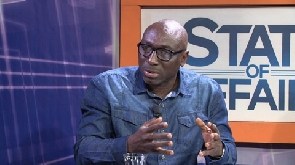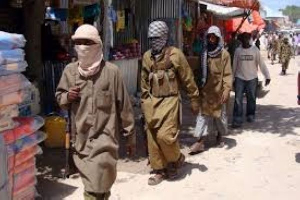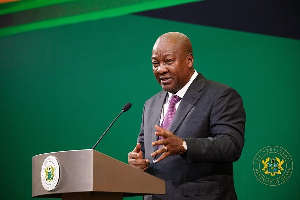People, I wrote this early last year, but most of it still applies, and I just wanted you to know. Until, of course, the Millennium Challenge Account cash starts settling in. But it won’t help if our mentality as a people doesn’t change, neither will our country.
Approximately 48 years ago, Kwame Nkrumah, then Father of a mushrooming nation, announced that “Ghana, our beloved country” was “free forever”. Now, anti-colonialism and anti-neo-colonial imperialism are the philosophies he is most remembered for.
The colonial British expected Ghanaian Independence to be much less of a struggle – their dealings with the well-educated and burgeoning middle-class elite were expected to be the stuff of post-Independence relations, where a seemingly independent state would run via remote control from Her Majesty’s kingdom: cheap raw materials from Ghana were expected to feed industries thousands of miles away, and would later be imported in their finished form at a premium. 48 years on, does this in any way sound familiar?
Ghana, pre-independence, was a country in which a chosen few were well-educated and industry was all but non-existent. Locally produced goods were seen as inferior, and it was laughable to compare them to imported ones. 48 years after Independence, industry is relatively limited, and locally produced goods are still lagging behind in terms of market positioning. So much so, I might add, the Ministry of Trade and Industry has set aside Fridays for wearing locally produced garments. One day in the week? Gee, thanks!
That’s not all. At the President’s inauguration at the beginning of last year, when almost all and sundry had taken it upon themselves to wear our resplendent and increasingly globalised kente cloth, the Hon. Minister of Trade and Industry was in a suit! I would accept the excuse, however, that even if it had been imported (I hope not, though!), someone like say, Ozwald Boateng was the designer-perpetrator. Yet a plethora of local designers was undoubtedly available. Uncle Alan, tell me something!
With an Oxford graduate-led NPP government, the Executive branch of government cannot be said to lack academic laurels, but the mentality remains the same, although the nomenclature has changed somewhat. The new catch-phrase is capacity building – implying that capacity for import substitution, at the very least, is lacking. Two generations down the line, we still don’t have the adequate human and financial resources to compete on the international front. Nkrumah must be spinning wildly.
Agrarian denotes the kind of economy Ghana has been described as having – to put it simply, agriculture based. Let’s examine that, shall we? Rice from Thailand, chicken from Belgium, tomatoes and onions from Burkina Faso, tomato purée recently manufactured by Italians in the Volta region, and curry from India…what’s so Ghanaian about Jolof and Chicken these days?
To cap it off, import tariffs for both rice and chicken, despite farmers crying out for help (and no, the Agricultural Development Bank can’t do EVERYTHING, though my finger remains pointed) remain at a paltry 20 per cent. Efforts to raise the tariff bar were recently quashed, with interim statute that would have legislated for the increase quickly repealed from the books, since we have to conform to International Trade Regulations; we don’t have the clout to change the situation. Pardon the pun, but that’s a chicken and egg situation.
We’re also told that import tariffs do not develop industry. However, if import tariffs on rice and chicken were to be used to provide revolving credit facilities to local growers (not the dreaded s-word, subsidies!!), who would have to keep proper books and pay tax, wouldn’t that be widening the proverbial tax net, and developing the economy?
Of course, agriculture is just one facet of the economy – never mind that it contributes to more than 45 per cent of our GDP. Cocoa’s the one that’s earning the cash. Oh, remind me, isn’t that the raw material for chocolate that they’re finding artificial substitutes for? [Didn’t Venezuela say something about organic cocoa?]
But we can be proud!! There are companies here that are earning foreign exchange, not by sending the raw material (progress!) but liqueur and butter. Foreign exchange is also trickling in from shea butter. So, yes, we have companies exporting secondary goods too! Where do they eventually end up? As starting products for large Cosmetic companies and luxury chocolatiers. Lindt or Golden Tree? I ask you!
You can also answer me this: Which world-renowned cosmetic company is owned (I’m being too harsh – co-owned, then) by a Ghanaian, or has its headquarters somewhere in Ghana?
Yet loans are being given left-and right to the import sector…pardon me, trading sector, and capacity is hardly being built in purely local industry…because the sector is too risky. Access to credit is somewhat difficult – after you’ve proved that you don’t need the loan, you can get one at a base rate of 24 per cent per annum. That’s an 8 per cent heap on inflation [that was then, it’s now a 13.5 per cent heap], and corporate tax is only 29.5 per cent at the very minimum.
Oh, but I am being pessimistic! We have always had a rich tradition of music! And HipLife, the foremost genre of local music, is Ghana’s own version of Hip Hop! Oh. Next!
48 years down the line, Ghana has become a country in which the then middle-class elite, spearheaded by the children (and some of the very same people) that Britain expected to hand over to, have taken over the reins of power in an acclaimed ‘Golden Age of Business’ where the government is supposed to create the enabling environment for business, yet the locals are thrust aside in favour of Foreign Direct Investment, without the essential operating environment. If the locals can’t thrive, how will the foreigners do it? But what it really boils down to is that opportunities should exist for Ghanaians FIRST!
48 years down the line, is it true that the pre-independence plan the British had for us really worked? Nearly half a century on, Ghana has changed from a country that was dependent on the colonial mentality and imports for survival, to a country that is dependent on a neocolonial mentality and imports for survival – and that’s probably because neocolonialism is all that’s left, rather than it being the preferred option. As the saying goes, the more things change, the more they stay the same.
What we have today is the result of things going horribly wrong, but to lay the blame squarely at the feet of the current government is far from fair. Our history is riddled with bullet holes from four coups, and a culture of corruption and mismanagement – with leaders usually starting out well-intentioned but ending up being swept away by a wave of power – but even when the end result isn’t pretty, there should be a clearly obvious step in the right direction. 48 years on, I’m sorry but I just don’t see it.















